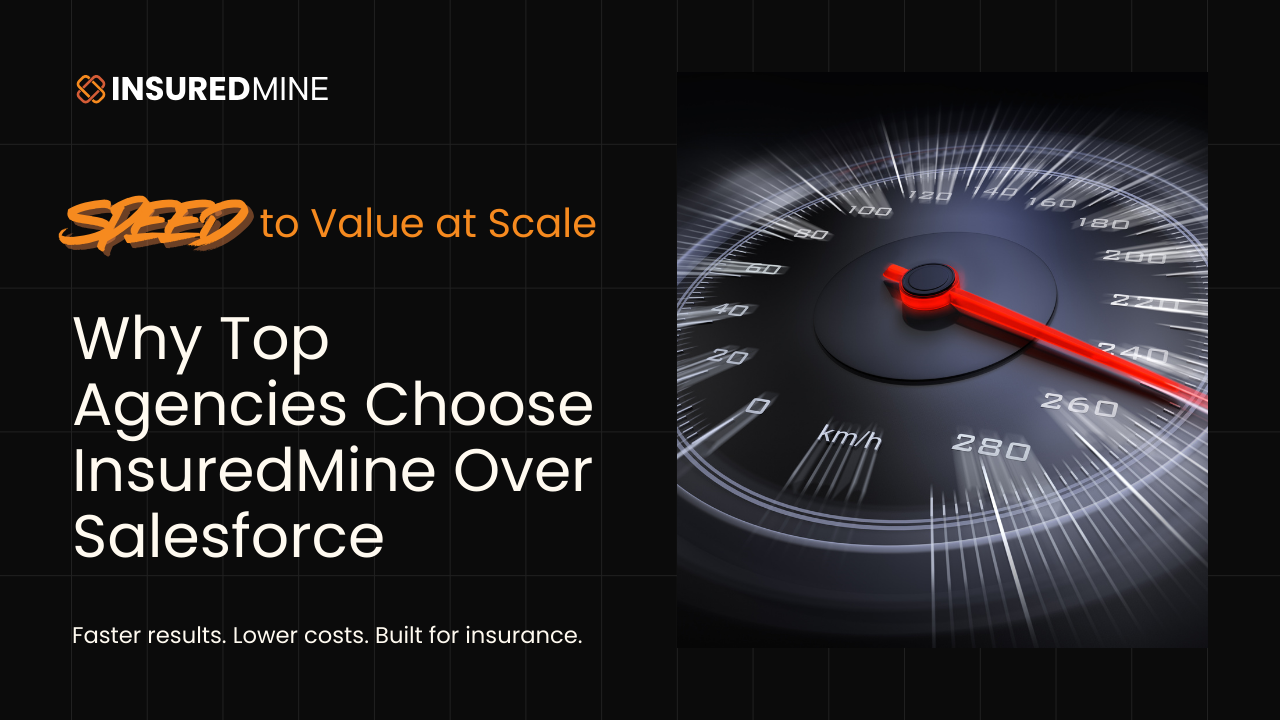You wouldn’t buy a car without researching several models and test-driving your top picks. So, why choose a CRM for your insurance agency without the same level of due diligence?
Yet many insurance agencies still select customer relationship management software based on buzzwords, vague demos, or gut feel, without evaluating which one is the best CRM for insurance agency growth.
In this guide, we’ll help you cut through the noise. You’ll get a clear insurance CRM comparison, including which features truly matter, why industry-specific platforms like InsuredMine CRM offer an advantage, and how the right solution can transform your agency.
According to a recent study by Grand View Research, a leading market research firm, the US CRM software market size was valued at around $22 billion in 2023 and projected to grow at a compound annual growth rate (CAGR) of 12.5% through 2030. This strong market growth is driven by the increasing digital transformation in the insurance industry, which is pushing companies to adopt more sophisticated CRM solutions to enhance customer experience and operational efficiency.
Firmly established for more than 20 years as an essential business tool for larger corporations, CRMs are relatively new in the insurance agency space.
A CRM can help agencies track policies, streamline renewals, organize leads, automate follow-ups, and improve customer service. It becomes the foundation of your insurance customer relationship management strategy, designed to help you grow and retain your book of business more efficiently.
Let me tell you a quick story.
Last year, an independent agent named Carla ran her growing P&C insurance agency in Des Moines. Her team of ten producers and account managers was juggling Excel sheets, Post-it notes, and a patchwork of apps to manage renewals, leads, and client conversations. Every Friday, Carla would stay late to cobble together data for Monday’s pipeline meeting. One Friday, as she stared at a sea of browser tabs and mismatched spreadsheets, she sighed: “There’s got to be a better way.”
Spoiler alert: There was. And that better way came in the form of a CRM built specifically for insurance.
In this guide, we’ll help you avoid Carla’s Friday-night chaos. We’ll walk through:
- Why a CRM is essential for insurance agencies
- How to evaluate CRM options with real-world criteria
- What features matter
- Why industry-specific solutions (like InsuredMine CRM) offer a strategic advantage
So if you’ve ever wondered how to choose the best CRM for your insurance agency, keep reading.
Why Insurance Agencies Need a CRM (Yes, Even the Small Ones)
You don’t have to run a mega-agency to feel the complexity of modern insurance sales. Between carrier communications, policy tracking, renewals, commissions, and client touchpoints, it’s easy to lose the thread.
But a well-chosen insurance CRM acts as your digital command center: streamlining ALL your data with ease. It can:
- Centralize client data
- Automate follow-ups and renewals
- Track sales pipelines in real time
- Improve team collaboration
- Enhance client experience and retention
- Improve our overall understanding of your agency’s business via simple and practical reporting capabilities
- Enhance your decision-making via machine learning and AI capabilities
Sounds too good to be true? Ever heard of a Swiss Army knife? Same concept. Think of it as the Swiss Army knife in your insurance tech stack—but only if you choose the right one.
The Real Problem: Too Many Tools, Not Enough Integration
Back to Carla. Before adopting a CRM, she used five different platforms for email marketing, texting clients, task management, and lead tracking. Not one of them talked to the others.
She wasn’t alone. Many independent agents use a patchwork of software solutions that look good individually but cause headaches collectively.
A well-integrated CRM doesn’t just add another tool—it replaces the disjointed ones.
What to Look for in the Best CRM for Your Insurance Agency
Choosing a CRM isn’t about picking the flashiest platform. It’s about aligning technology with how your agency works. After hearing from hundreds of agencies, large to small, about their pain points, here’s what matters most:
- Insurance-Specific Functionality
Generic CRMs might offer workflows and pipelines, but they rarely support the unique nuances of insurance. Things like:
- Policy lifecycle tracking
- Carrier management
- Commission reconciliation
- Renewal workflows
- Out-of-the-box integrations with prevalent insurance agency systems and software
That’s where purpose-built platforms like InsuredMine CRM shine.
- Easy Automation Without the IT Headache
Carla applauds this aspect the most! Freeing her to be home with her kiddos and husband on a Friday night, enjoying popcorn and a movie, she says, is her most loved benefit.
If you want that too, then look for automation features that:
- Trigger emails and texts based on client behavior
- Schedule renewal reminders automatically
- Score leads and assign follow-ups
If it takes a full-time admin to run your automation, it’s not saving you time.
- Sales and Pipeline Visibility
Your CRM should answer:
- How many new leads came in this week?
- Which producers are converting the most?
- What’s in the pipeline for next quarter?
Tools like InsuredMine provide dashboards that make this info immediately accessible. No Carla needed.
- Seamless Communication Tools
Can you email, text, and call clients directly from your CRM? Can you see those interactions logged in the contact record?
That level of visibility saves hours of guesswork and creates consistency across your team. If your current system doesn’t offer that, you’re likely already feeling the friction — but the good news is, it’s fixable.”
- Integration with Your Existing Systems
Your CRM shouldn’t live in a silo.
Look for one that integrates with:
- Your agency management system (AMS)
- Quoting platforms
- VOIP phone systems
- Email tools like Outlook or Gmail
InsuredMine, for example, integrates with top AMS like Applied Epic, AMS 360, QQ Catalyst, Sagitta, Nexsure, NowCerts, EZLynx, Hawksoft, and Xanatek.
Don’t Just Take the Demo. Ask These Questions:
A flashy demo doesn’t mean it’s the right fit. With any demo, you should always probe further. Here are a few questions to dig deeper:
- Is this CRM built specifically for insurance?
- How long does onboarding take?
- What kind of support is available?
- How customizable are the workflows?
- What integrations are native (vs. third-party)?
And most importantly: How will this CRM help my agency grow?
These are exactly the kinds of questions platforms like InsuredMine are designed to answer with clarity and confidence.
The Hidden ROI: How the Right CRM Pays for Itself
Let’s go back to Carla. Three months after switching to InsuredMine, her agency:
- Reduced missed renewals by 80%
- Increased cross-sells by 40%
- Cut onboarding time for new producers in half
- Was tracking for operating efficiency gains of 10-15%
The CRM paid for itself within the first quarter. She was thrilled, and her team felt supported.
That’s the kind of ROI you should expect when the technology aligns with your business.
Final Thoughts: Choosing with Confidence
There are dozens of CRMs out there. But very few are built for insurance agents by people who understand insurance.
Choosing the right CRM isn’t about features—it’s about fit. The best CRM is the one that:
- Matches your workflows
- Supports your growth
- Frees your time
- And feels intuitive from day one
InsuredMine CRM was built with exactly those goals in mind.
So, if you’re ready to move beyond browser tabs and sticky notes, maybe it’s time for your own Carla moment.
Technology should feel like a partner, not a burden. When your CRM works with you, not against you, everything changes.

































